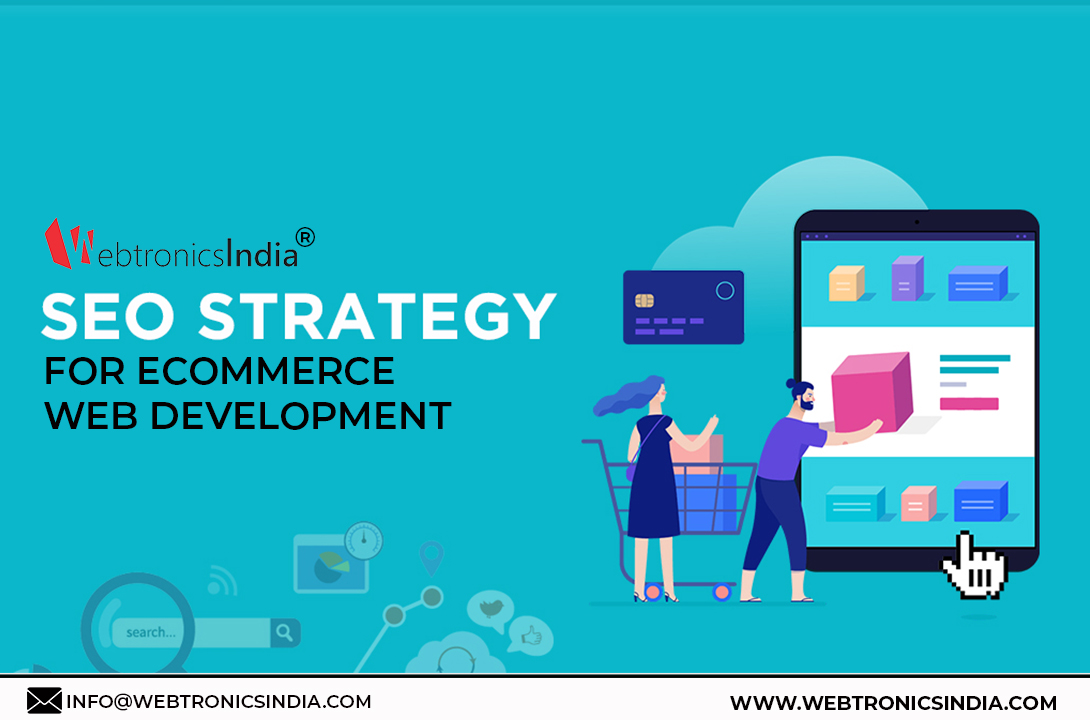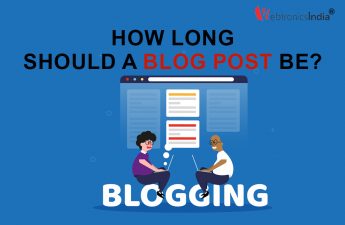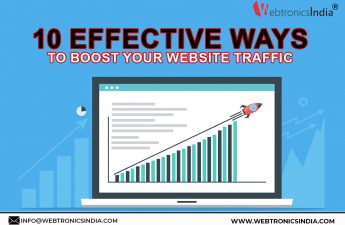Your eCommerce business may or may not have a physical store to sell your product or services but using SEO or Search Engine Optimization is one of the best ways to ensure that your business reaches customers. Using the 17 SEO strategies for eCommerce web development mentioned in this blog, you can get sales and beat your competition in no time.
93% of the online users start with a search query. In SEO, the main purpose is to make it to the top 5 positions on SERP or search engine result page. This is because the user usually clicks on the top 5 search results and ignores the rest.
In the current scenario, more than 50% of customers research the product online before visiting the physical store. This has resulted in businesses optimizing their eCommerce website for a better digital experience. Therefore, these 17 SEO strategies for eCommerce web development are more than necessary to attract the customer towards your online business.
SEO helps in bringing traffic to the website, improves the rankings in SERP, and helps in increasing the product and brand awareness in the market. However, the process to optimize an eCommerce website is different from the other websites.
What is the difference between eCommerce SEO and Local SEO?
An eCommerce SEO agency focuses on optimizing individual pages and products so that they rank higher and get a better conversion as compared to the competitor’s pages. On the other hand, Local SEO is about targeting users who are searching for businesses or services in a specific geographical location.
As compared to Local SEO, eCommerce SEO is much more dynamic due to the constant turnover in the inventory. As eCommerce is a broad topic, several factors play an important role in increasing the page rank of an eCommerce site.
If you are a power brand, you already have the benefit of brand popularity and a loyal fan following. But if you are a beginner eCommerce site, you must utilize SEO strategies to bring customers to their product or your competitors will take away your sales and business.
Let’s take a look at the 17 SEO strategies for Ecommerce Web Development. These tips can be utilized by website owners for building brand awareness and better product sales.
- Use HTTPS (and not HTTP) – HTTPS protects the communication between the browser and server from being tampered with by attackers. It offers authentication to the majority of world wide web traffic.
- User Appropriate URLs – Make sure that your website URLs can be easily crawled by the search engines. Keep them short and include relevant keywords.
- Make Use of Long-Tail Keywords – Long-term keywords indicate the intent of users and serve as a goldmine for search engine optimization. Studies show that more than 60% of the searches contain long-term keywords and they signify that the buyer is close to the end of the searcher’s journey. These keywords have low competition with exact matches.
- Use Structured Data and Rich Snippets – Structured data is a type of code that helps search engines like Google crawl, organize, and display your content. It helps search engines understand your data.
With the help of rich snippets, eCommerce websites can boost their rank by providing price, ratings, availability, and other exact details to the search engine like Google.
- Avoid Duplicate Content – Duplicate content adds little to no value for your website visitor and is not acceptable by search engines. As a website owner, you must avoid using duplicate content in your eCommerce site as it may affect your SEO performance. Google is known for penalizing duplicate content. You can use Google Search Console to identify duplicate content.
- Give Unique Product Descriptions – Give unique and detailed product descriptions with relevant keywords of the brand.
- Add Product Reviews – Google and all the other search engines want more and more user-generated content or UGC. Allow the users to drop comments and reviews on your eCommerce website to improve engagement. eCommerce platforms like Magento and Shopify have applications to add reviews to your pages.
- Make Your Website Mobile-Friendly – This is one of the most important steps for building a successful eCommerce website. With more and more users browsing on mobile devices as compared to desktop, it is essential to have a mobile-friendly website to get more customers. A poor mobile experience will bring down your rankings on Google.
- Improve Page Speed – Google’s PageSpeed Insights Tool helps in testing the speed of a webpage quickly. Enter the URL and hit ‘Analyze’ to get a detailed report of what’s slowing your web page and fix it with the help of given recommendations. A fast-loading page ensures a better user experience.
- No Keyword Cannibalization – Keyword cannibalization means that you have articles or blogs on your website that rank for the same search query or keyword in Google. This is not a good practice as both the pages are eating away at each other’s chance to rank on the search engine result page. Avoid keyword cannibalization as it may dilute the ranking of the important pages of your website.
- Use an appropriate Title Tag – The Title Tag is one of the most critical elements of an eCommerce website and is important for both users and search engines. Ensure that the title of your webpage is unique and relevant to the product and includes the primary keyword.
- Use Relevant ALT tags for Graphics or Images – Add product description as well as model numbers to the alt tags for better SEO.
- Meta-Descriptions for SEM – A Meta-description is a text snippet that summarizes the content of a page in up to 60 characters. Google has confirmed it doesn’t use meta-description in the ranking algorithm directly. But, it does use CTR or click-through rate of a page to check how well your webpage fits the search query.
As meta-description helps you to increase the CTR of your web page, it is a good way to improve your Google ranking.
- Use Internal Linking – Link building is an essential element as it contributes to more than 50% of your website’s SEO success. You should create many internal links to boost rankings and set a page hierarchy for the google bots. Internal linking is a great way to improve user engagement.
- Make use of 301 Redirects – A 301 redirect is a permanent redirect that passes the full ranking power to the redirected page. 301 refers to the HTTPS status code for this redirect. If you redo your website, make use of 301 redirect to ensure that the search engines find the older content and not a 404 – not found message.
- Link Building – Linking building, also known as backlinking is an essential practice for long-term traffic building. The effort is required in the beginning and it pays off over time just like compound interest. In eCommerce websites, ranking highly on
Google for relevant terms is similar to having a shop on a popular and busy high street. This means that you have the potential to get a lot of sales because you are at the right place at the right time. Some of the effective link building strategies for eCommerce are:
- Create a blog and research your competitors.
- Link to your product pages with resource page link building.
- Make use of FAQ or frequently asked questions.
- Develop affiliate partnerships to get affiliate links.
- SEO Branding – You should include your brand name in your marketing sections like emails, meta-tags, videos, etc. This is a good technique yet ignored by many online businesses.
If you are running an SEO campaign for your brand, you may target long-term keywords along with your brand name like ‘JBL noise cancellation headphones.’ Here, noise cancellation headphones is a phrase used by others too, JBL can be used only by the JBL company. Including your brand name in the keyword will improve your chances of ranking in SERP due to its relevance.
Use these 17 SEO strategies for eCommerce web development to improve the rank of your web pages on SERP and for better clicks and sales for your online business.
Summing Up
Although Google keeps changing or tweaking its algorithm, the above strategies will remain valid for a while. Follow all the above 17 SEO Strategies for Ecommerce Web Development to increase your website rankings. Following these tips will give you an edge over your competitors. If the customers are happy with what you offer, and the way you offer it, they are likely to come back again, giving you repeat business. A good user interface followed by good SEO helps in running a successful eCommerce website.




